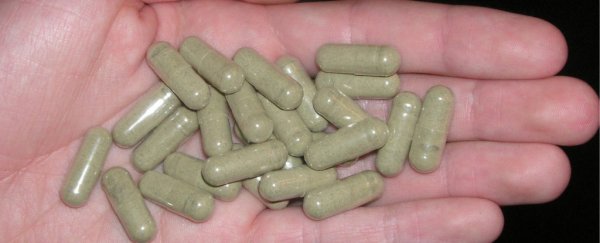A controversial, opiate-like herb known as kratom is quickly becoming a problem for United States poison control.
In the last few years, poison control centres have experienced an explosion of phone calls regarding this herbal supplement, which is increasingly being used for pain, depression, anxiety and even opioid withdrawal.
Kratom (Mitragyna speciosa) is a plant species that grows in Thailand, Malaysia, Indonesia and Papua New Guinea. Recently, more and more of it has been crossing the US border in the form of an innocent-looking green powder.
In the US, kratom is only classified as a herbal supplement, and because of that, many Americans assume that it is safe to take. In reality, scientists know very little about this substance, including what it can treat, whether it's addictive, and what a safe dosage truly is.
So while some claim that this drug has saved their lives from opioids, without regulation, research, and guidance, the substance has also proved life-threatening, with at least 44 deaths attributed to its use.
Analysing information from the National Poison Data System, a new study now adds weight to the fear that one day, kratom could simply expand the opioid epidemic.
From 2011 to 2017, it appears that kratom triggered more than 1,800 phone calls to the nation's poison control centres, and 65 percent of those calls were made in the last two years.
That's an exponential increase in just seven years, with the number of annual calls going from 13 to 682 - a 52.5-fold leap that is equivalent to jumping from one call a month to two calls a day.
More than half of these cases resulted in moderate to severe health repercussions, including seizures, rapid heart beats, difficulty breathing, coma and kidney failure.
In eleven of these cases, the symptoms were fatal, and this was especially common among those who had multiple drugs in their system.
In fact, the study found that those who took another drug alongside kratom - such as alcohol, cocaine, benzodiazepenes and fentanyl - were more than twice as likely to have serious health repercussions.
"Kratom use has been associated with a variety of serious medical outcomes, from seizures and coma in adults to severe withdrawal syndrome in newborns," says co-author Henry Spiller, director of the Central Ohio Poison Center at Nationwide Children's Hospital.
"Individuals who choose to use kratom need to be aware of the potential risks. Just because it is currently classified as a herbal supplement does not mean it is regulated or that it is safe."
For several years now, kratom has been listed by the Drug Enforcement Administration (DEA) as a "drug of concern" and the FDA has issued several warnings about its medicinal use.
From what we know so far, kratom binds to opioid receptors in the brain as well as serotonin receptors, which is what many anti-depressants target. But while some studies suggest that kratom could be a better alternative to methadone, the FDA has yet to approve it for any medical use, let alone opioid addiction.
"There is no reliable evidence to support the use of kratom as a treatment for opioid use disorder," reads a statement from FDA Commissioner Scott Gottlieb written in 2017.
"Patients addicted to opioids are using kratom without dependable instructions for use and more importantly, without consultation with a licensed health care provider about the product's dangers, potential side effects or interactions with other drugs."
To be fair, kratom rarely causes death on its own. In fact, there is only one case thought to be purely because of this exotic herb. But that doesn't mean there isn't reason to worry.
Despite the FDA's warnings, people are continuing to use this herbal supplement in dangerous and unregulated ways. The new study found that the majority of cases involved men, and almost all the patients were adults over 20 years of age.
Yet perhaps more worrisome is the way it impacts children. About 2.5 percent of calls were related to children under the age of 12, and most of the kids affected were younger than two years of age.
Even more startling, seven of the calls were about newborns, five of whom were suffering withdrawal symptoms due to kratom exposure in the womb, and one of whom was reportedly exposed to kratom from breastfeeding.
The authors are calling on the FDA to stop considering kratom a "dietary supplement" and start regulating it like a drug, ensuring its quality and safety, as well as further research.
This study has been published in Clinical Toxicology.
